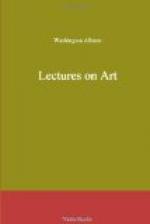man assert this even of himself, he is not to be believed;
he lies to his own heart,—and this he may
do without being conscious of it. But how can
this be? Nothing more easy: by a simple
dislocation of words; by the aid of that false nomenclature
which began with the first Fratricide, and has continued
to accumulate through successive ages, till it reached
its consummation, for every possible sin, in the French
Revolution. Indeed, there are few things more
easy; it is only to transfer to the evil the name
of its opposite. Some of us, perhaps, may have
witnessed the savage exultation of some hardened wretch,
when the accidental spectator of an atrocious act.
But is such exultation pleasure? Is it at all
akin to what is recognized as pleasure even by this
hardened wretch? Yet so he may call it.
But should we, could we look into his heart?
Should we not rather pause for a time, from mere ignorance
of the true vernacular of sin. What he feels
may thus be a mystery to all but the reprobate; but
it is not pleasure either in the deed or the doer:
for, as the law of Good is Harmony, so is Discord that
of Evil; and as sympathy to Harmony, so is revulsion
to Discord. And where is hatred deepest and deadliest?
Among the wicked. Yet they often hate the good.
True: but not goodness, not the good man’s
virtues; these they envy, and hate him for possessing
them. But more commonly the object of dislike
is first stripped of his virtues by detraction; the
detractor then supplies their place by the needful
vices,—perhaps with his own; then, indeed,
he is ripe for hatred. When a sinful act is made
personal, it is another affair; it then becomes a
part
of
the man; and he may then worship it with
the idolatry of a devil. But there is a vast
gulf between his own idol and that of another.
To prevent misapprehension, we would here observe,
that we do not affirm of either Good or Evil any irresistible
power of enforcing love or exciting abhorrence, having
evidence to the contrary in the multitudes about us;
all we affirm is, that, when contemplated abstractly,
they cannot be viewed otherwise. Nor is the fact
of their inefficiency in many cases difficult of solution,
when it is remembered that the very condition to their
true effect is the complete absence of self,
that they must clearly be viewed ab extra;
a hard, not to say impracticable, condition to the
very depraved; for it may well be doubted if to such
minds any act or object having a moral nature can
be presented without some personal relation.
It is not therefore surprising, that, where the condition
is so precluded, there should be, not only no proper
response to the law of Good or Evil, but such frequent
misapprehension of their true character. Were
it possible to see with the eyes of others, this might
not so often occur; for it need not be remarked, that
few things, if any, ever retain their proper forms
in the atmosphere of self-love; a fact that will account




